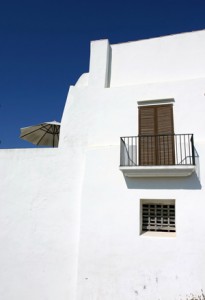Question 1 from Client:
I wonder if you can help as we are getting conflicting information from all sides on this property, which was built about 20 years ago on rustic land set in a small hamlet of similar aged properties – villas rather than fincas. All the properties have mains metered services – water, electricity and telephone.
 The owners are in the process of getting an outbuilding/casita added to the catastral to match what is in the deeds and they are also having the swimming pool added to the deeds to match what is on the catastral. However, our lawyer has been told that the outbuilding, described on the deeds as vivienda, is not registered at the town hall. It is this that is currently being added to the catastral. Are you able to tell us how important it is for it to be also registered at the town hall? We have been told that in order to do so the owners would have to get the ‘asimilacion de fuera de ordinacion’ at a cost of 11k euros and they say they do not believe it is necessary. It is this which is preventing us from proceeding with the deposit and hence the survey.
The owners are in the process of getting an outbuilding/casita added to the catastral to match what is in the deeds and they are also having the swimming pool added to the deeds to match what is on the catastral. However, our lawyer has been told that the outbuilding, described on the deeds as vivienda, is not registered at the town hall. It is this that is currently being added to the catastral. Are you able to tell us how important it is for it to be also registered at the town hall? We have been told that in order to do so the owners would have to get the ‘asimilacion de fuera de ordinacion’ at a cost of 11k euros and they say they do not believe it is necessary. It is this which is preventing us from proceeding with the deposit and hence the survey.
Answer 1 from Survey Spain:
In the past it was possible to get services without all the building permissions, but not so now. Therefore, a 20 yr old building with metered services and even paying IBI to the town hall is not a guarantee that all is legal. With regard to the permissions, you certainly want the current owners to be responsible for the costs and hassle of obtaining these. You need to check the detailed requirements in each case relating to an asimilacion de fuera de ordinacion, but it’s not good news as it indicates that the Ayuntamiento thinks that the building contravenes the planning regulations and needs a special permission or has to be demolished. There may also be a fine. If the town hall says it’s necessary it seems short sighted to stop the sale for the sake of a relatively small payment, unless the seller knows that they cannot comply!
Question 2 from Client:
Thanks for initial response. It was the absence of the outbuilding/casita [unconverted] from the catastral which prompted the official at the town hall to advise on obtaining the ‘asimilacion’. Prior to that discovery the official did not see much purpose in obtaining unless we proposed to apply to make any alterations to any of the buildings. But the outbuilding/casita is described on the escritura so what is it that gets registered and referred to at the town hall ?
Answer 2 from Survey Spain:
The details on the escritura are provided to the Notary by ‘Declaration’ of the owner. Therefore, if the notary receives all the appropriate paperwork for the buildings that are declared, then he is happy. Nobody goes to the property to check everything there is declared, although the building professionals and solicitor should not be a party to any deliberate misrepresentation. Equally, nobody from the Title Registry checks if there are been changes thereafter, as again that’s the responsibility of the owner.
Owners leave extensions off property so that they will pay less annual tax and tax on the sale/purchase. The Spanish tax authorities got fed up with under declared property and so stated that mortgage valuations must be based on the lower of the title description or the actual property. Thus there is an incentive to register everything. The tax authorities have also placed minimum valuations on every property, based on the Catastral Value, to try to catch tax evasion by sellers demanding un-declared part cash payments from the buyer. This has resulted in sellers and buyers sometimes finding tax being levied on a value higher than the genuine price being paid for the property.
The Catastral description is the one that tax is based upon. It is independent of the Title registry. It obtains it’s info from planning permissions granted and by inspections, both physical and increasingly by aerial photo comparisons. As a result it is usually more accurate, but by no means always. There are regular revaluations carried out, in the same way as in the UK for rateable value, though here it’s based on a notional capital value whilst in the UK it’s based on a notional rental value. So, if the casita is missing, it means that the taxable value of the property will be less and so they will be keen to add it to the description. However, the fact that it’s missing can also mean that it hasn’t gone through the permission process and may not be fully legal. For a buyer, whilst it means that the tax on the purchase and future occupation will be higher, they should always insist on the official description being complete so that they are not penalised for illegal buildings in the future, possible back taxes from before their purchase and the costs and inconvenience of having to get all the permissions correct, if that is possible.




